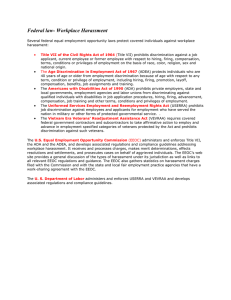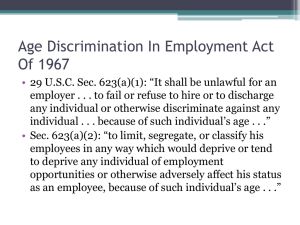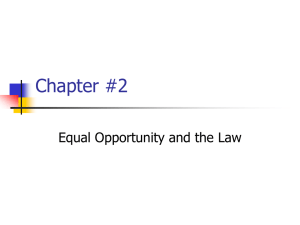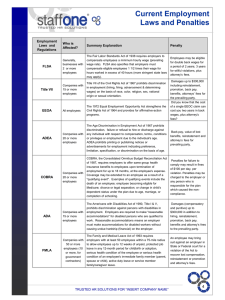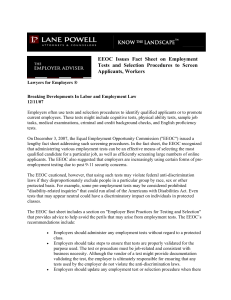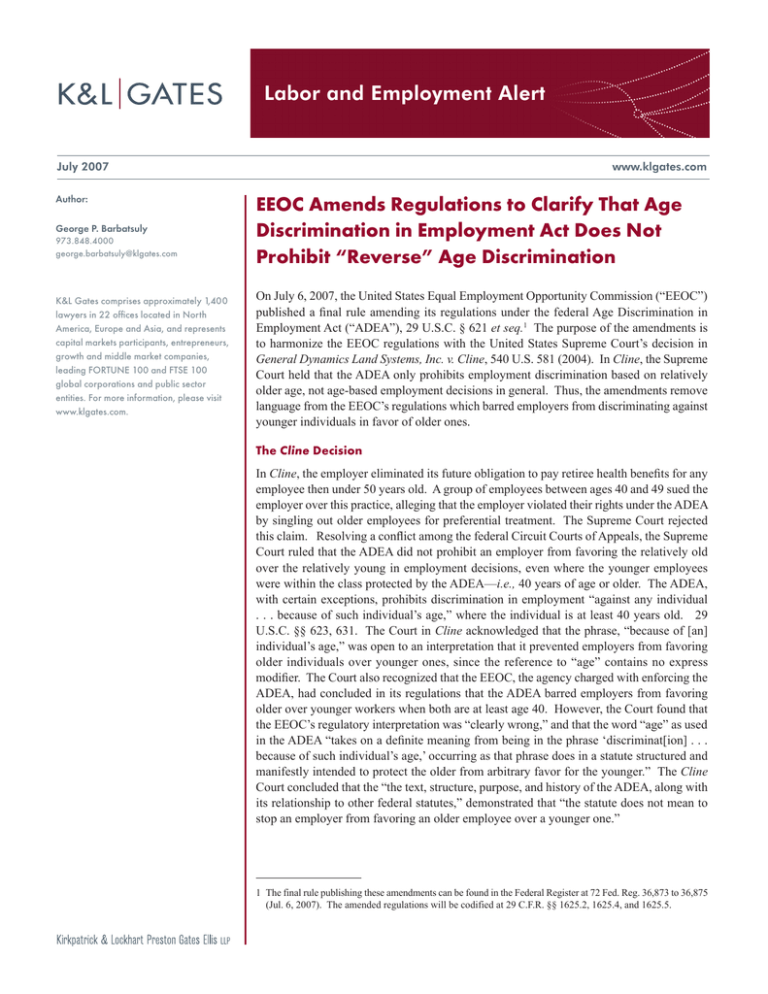
Labor and Employment Alert
July 2007
Author:
George P. Barbatsuly
973.848.4000
george.barbatsuly@klgates.com
K&L Gates comprises approximately 1,400
lawyers in 22 offices located in North
America, Europe and Asia, and represents
capital markets participants, entrepreneurs,
growth and middle market companies,
leading FORTUNE 100 and FTSE 100
global corporations and public sector
entities. For more information, please visit
www.klgates.com.
www.klgates.com
EEOC Amends Regulations to Clarify That Age
Discrimination in Employment Act Does Not
Prohibit “Reverse” Age Discrimination
On July 6, 2007, the United States Equal Employment Opportunity Commission (“EEOC”)
published a final rule amending its regulations under the federal Age Discrimination in
Employment Act (“ADEA”), 29 U.S.C. § 621 et seq. The purpose of the amendments is
to harmonize the EEOC regulations with the United States Supreme Court’s decision in
General Dynamics Land Systems, Inc. v. Cline, 540 U.S. 581 (2004). In Cline, the Supreme
Court held that the ADEA only prohibits employment discrimination based on relatively
older age, not age-based employment decisions in general. Thus, the amendments remove
language from the EEOC’s regulations which barred employers from discriminating against
younger individuals in favor of older ones.
The Cline Decision
In Cline, the employer eliminated its future obligation to pay retiree health benefits for any
employee then under 50 years old. A group of employees between ages 40 and 49 sued the
employer over this practice, alleging that the employer violated their rights under the ADEA
by singling out older employees for preferential treatment. The Supreme Court rejected
this claim. Resolving a conflict among the federal Circuit Courts of Appeals, the Supreme
Court ruled that the ADEA did not prohibit an employer from favoring the relatively old
over the relatively young in employment decisions, even where the younger employees
were within the class protected by the ADEA—i.e., 40 years of age or older. The ADEA,
with certain exceptions, prohibits discrimination in employment “against any individual
. . . because of such individual’s age,” where the individual is at least 40 years old. 29
U.S.C. §§ 623, 631. The Court in Cline acknowledged that the phrase, “because of [an]
individual’s age,” was open to an interpretation that it prevented employers from favoring
older individuals over younger ones, since the reference to “age” contains no express
modifier. The Court also recognized that the EEOC, the agency charged with enforcing the
ADEA, had concluded in its regulations that the ADEA barred employers from favoring
older over younger workers when both are at least age 40. However, the Court found that
the EEOC’s regulatory interpretation was “clearly wrong,” and that the word “age” as used
in the ADEA “takes on a definite meaning from being in the phrase ‘discriminat[ion] . . .
because of such individual’s age,’ occurring as that phrase does in a statute structured and
manifestly intended to protect the older from arbitrary favor for the younger.” The Cline
Court concluded that the “the text, structure, purpose, and history of the ADEA, along with
its relationship to other federal statutes,” demonstrated that “the statute does not mean to
stop an employer from favoring an older employee over a younger one.”
T
he final rule publishing these amendments can be found in the Federal Register at 72 Fed. Reg. 36,873 to 36,875
(Jul. 6, 2007). The amended regulations will be codified at 29 C.F.R. §§ 1625.2, 1625.4, and 1625.5.
Labor and Employment Alert
The Amended EEOC Regulations
To conform to the Cline decision, the EEOC amended
its regulations effective July 6, 2007. The amendments
now specifically provide that employers may favor an
older individual over a younger individual because of
age under the ADEA, even if the younger individual is
at least age 40. Also, while the prior regulations barred
employers from posting advertisements expressing
a preference for older individuals, the amended
regulations now specifically allow employers to use
such phrases as, “over age 60,” “retirees,” “supplement
your pension,” and similar phrases in help wanted
notices and other employment advertisements.
However, in response to a concern raised during the
public comment period that the amended regulations
may be construed as creating an enforceable right
requiring employers to favor older individuals,
the EEOC included language in the amendments
specifically providing that “the ADEA does not require
employers to prefer older individuals and does not
affect applicable state, municipal, or local laws that
prohibit such preferences.”
Consistent with the prior EEOC regulations, the
amendments provide that an employer’s request for
an applicant’s age or date of birth on an employment
application form does not, in itself, violate the ADEA.
However, the regulations state that the EEOC will
closely scrutinize such requests to ensure that the
information is not being sought for an unlawful
purpose. In the preamble to the final rule publishing the
amendments, the EEOC expressly points out that the
amendments should not be construed as encouraging
employers to request an applicant’s age or date of birth
on an employment application.
State and Local Laws Prohibiting “Reverse”
Age Discrimination Not Affected
The amended regulations remind employers that the
ADEA does not affect state or local laws that prohibit
employers from favoring older individuals over younger
ones. This is significant because a number of courts
interpreting parallel state anti-discrimination laws have
recognized claims of “reverse” age discrimination by
younger individuals alleging they have experienced
discrimination in favor of older individuals. Thus,
employers considering whether to implement policies
designed to favor older workers or applicants should
consult legal counsel to ensure that such policies do not
run afoul of applicable state or local anti-discrimination
laws.
S ee, e.g., Ace Elec. Contrs. v. IBEW, Local Union No. 292, 414
F.3d 896, 902-03 (8th Cir. 2005) (unlike the ADEA, the Minnesota
Human Rights Act prohibits employers from making employment
decisions based on age, even where the decision benefits older
workers); Zanni v. Medaphis Physician Servs. Corp., 612 N.W.2d
845, 847 (Mich. Ct. App.) (Michigan’s Elliott Larsen Civil Rights
Act “protects workers who are discriminated against on the basis
of their youth”), appeal denied, 618 N.W.2d 596 (Mich. 2000);
Bergen Commercial Bank v. Sisler, 723 A.2d 944, 957 (N.J. 1999)
(New Jersey Law Against Discrimination’s “prohibition against
age discrimination is broad enough to accommodate [plaintiff’s]
claim of age discrimination based on youth”); Ogden v. Bureau
of Labor, 699 P.2d 189, 192 (Or. 1985) (en banc) (interpreting
Oregon’s age discrimination law as allowing claims by younger
workers); McLean Trucking Co. v. State Human Rights Appeal
Bd, 437 N.Y.S. 2d 309 (1st Dep’t 1981) (upholding finding that
employer violated New York State Human Rights Law when it
applied a minimum age requirement of 24 to reject a 23-year old
applicant), aff’d, 55 N.Y.2d 910 (1982).
July 2007 | Labor and Employment Alert
K&L Gates comprises multiple affiliated partnerships: a limited liability partnership with the full name Kirkpatrick & Lockhart Preston Gates Ellis LLP qualified in
Delaware and maintaining offices throughout the U.S., in Berlin, and in Beijing (Kirkpatrick & Lockhart Preston Gates Ellis LLP Beijing Representative Office); a
limited liability partnership (also named Kirkpatrick & Lockhart Preston Gates Ellis LLP) incorporated in England and maintaining our London office; a Taiwan
general partnership (Kirkpatrick & Lockhart Preston Gates Ellis) which practices from our Taipei office; and a Hong Kong general partnership (Kirkpatrick &
Lockhart Preston Gates Ellis, Solicitors) which practices from our Hong Kong office. K&L Gates maintains appropriate registrations in the jurisdictions in which
its offices are located. A list of the partners in each entity is available for inspection at any K&L Gates office.
This publication/newsletter is for informational purposes and does not contain or convey legal advice. The information herein should not be used or relied
upon in regard to any particular facts or circumstances without first consulting a lawyer.
Data Protection Act 1998—We may contact you from time to time with information on Kirkpatrick & Lockhart Preston Gates Ellis LLP seminars and with our
regular newsletters, which may be of interest to you. We will not provide your details to any third parties. Please e-mail london@klgates.com if you would prefer
not to receive this information.
©1996-2007 Kirkpatrick & Lockhart Preston Gates Ellis LLP. All Rights Reserved.
July 2007 |

